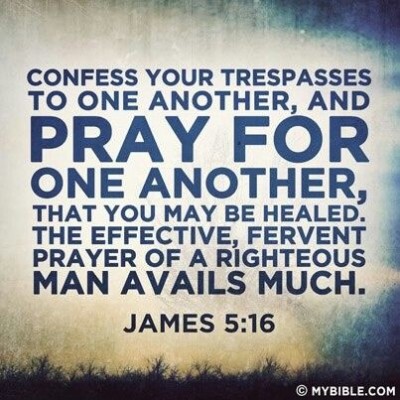James 5:13 – 20
13 Is anyone among you in trouble? Let them pray. Is anyone happy? Let them sing songs of praise. 14 Is anyone among you sick? Let them call the elders of the church to pray over them and anoint them with oil in the name of the Lord. 15 And the prayer offered in faith will make the sick person well; the Lord will raise them up. If they have sinned, they will be forgiven. 16 Therefore confess your sins to each other and pray for each other so that you may be healed. The prayer of a righteous person is powerful and effective.
17 Elijah was a human being, even as we are. He prayed earnestly that it would not rain, and it did not rain on the land for three and a half years. 18 Again he prayed, and the heavens gave rain, and the earth produced its crops.
19 My brothers and sisters, if one of you should wander from the truth and someone should bring that person back,20 remember this: Whoever turns a sinner from the error of their way will save them from death and cover over a multitude of sins.
1. Pray in times of trouble. The kind of trouble is not specified; it is a general verb, kakopatheo. “Is anyone among you suffering?” (NASB). Like James’s original readers, we might allow the fact of trouble to suggest that God is uncaring or unknowing or unable to help, and so we would pray less. The biblical instruction is the opposite: pray more. Trouble is the very time to pray.
2. Pray in times of happiness. No single cause for happiness is specified; it is a general verb, euthymeo. “Is anyone cheerful” (NASB) or encouraged? Like James’s original readers, we might allow times of happiness to make us complacent, and so we would pray less. The biblical instruction is again the opposite: pray more. Happiness is the very time to sing songs of praise.
3. Pray in times of sickness. No particular disease is identified; it is a general verb, astheneo, meaning to be weak or sick. Like James’s original readers, we easily feel defeated in times of sickness. Weakness makes us feel hopeless, as if there were nothing to do. The biblical outlook is the opposite: there is something very significant to do, namely, to pray. Weakness is the very time for prayer. O. Hallesby, the great teacher on prayer, wrote, “Your helplessness is your best prayer.”
He is writing to people struggling in hardship. Martin is right to comment that in urging them to pray, James is “allowing for a positive response to hardship” instead of “advocating a stoic or impassive response to adversity” (1988:205). But it is more than that. These verses, coming as the conclusion to all James has addressed in his readers’ lives, describe a healing of their relationships with God and with each other.
Their relationships need healing. As a first result of their hardships, their relationship with God has been suffering. They are falling into temptation to doubt God (1:6), to blame God (1:13) and to bargain with God (5:12). James is directing them back to God in faith with a reliance on him in prayer.
A second result of their adversities is that their relationships with each other have been suffering. James has had to warn them against the evils of playing favorites with each other (2:1), verbally attacking each other (3:9), fighting with each other (4:1), slandering each other (4:11) and judging each other (4:12).
Now this present passage helps us realize what a dramatic transformation of relationships James envisions. He points out the oneness we have with each other because of our common need for forgiveness. If we consciously stand together before God as sinners needing grace and wanting righteousness, that stance has compelling application to our relationships.
- Instead of judging each other, we will be driven to confess to each other.
- Instead of desiring to place guilt on each other, we will become eager to forgive each other.
- Instead of moving to criticize, we will move to intercede for each other.
A spirit of reconciliation will pervade the church. This, too, James learned from Jesus (Mt 5:23-24; 6:12-15; 7:1-5).
James’s vision: elders leading worship with a spiritual authority in the name of Jesus; Christians praising God joyfully, confessing their sins openly and praying for each other lovingly; the church together experiencing spiritual cleansing and physical healing. This is the exciting power of prayer.
Who here is in trouble in any area of their life?
Why won’t we confess our sins to each other and pray for each other?
– Don’t know each other that well; afraid they will tell someone else.
Hebrews 10: 24 And let us consider how we may spur one another on toward love and good deeds, 25 not giving up meeting together, as some are in the habit of doing, but encouraging one another—and all the more as you see the Day approaching.
What do you think will happen if someone knows the truth about your situation?
– They will think less of me (pride, fear)
Do you want to stay in your situation, or be free?
– If you stay cut off from everyone else, and keep doing things as you have done them, you will remain cut off and isolated. If you think you can do this alone, by yourself, you are wrong. You can’t. God didn’t make us to be Lone Ranger Christians. “16 Therefore confess your sins to each other and pray for each other so that you may be healed.”
